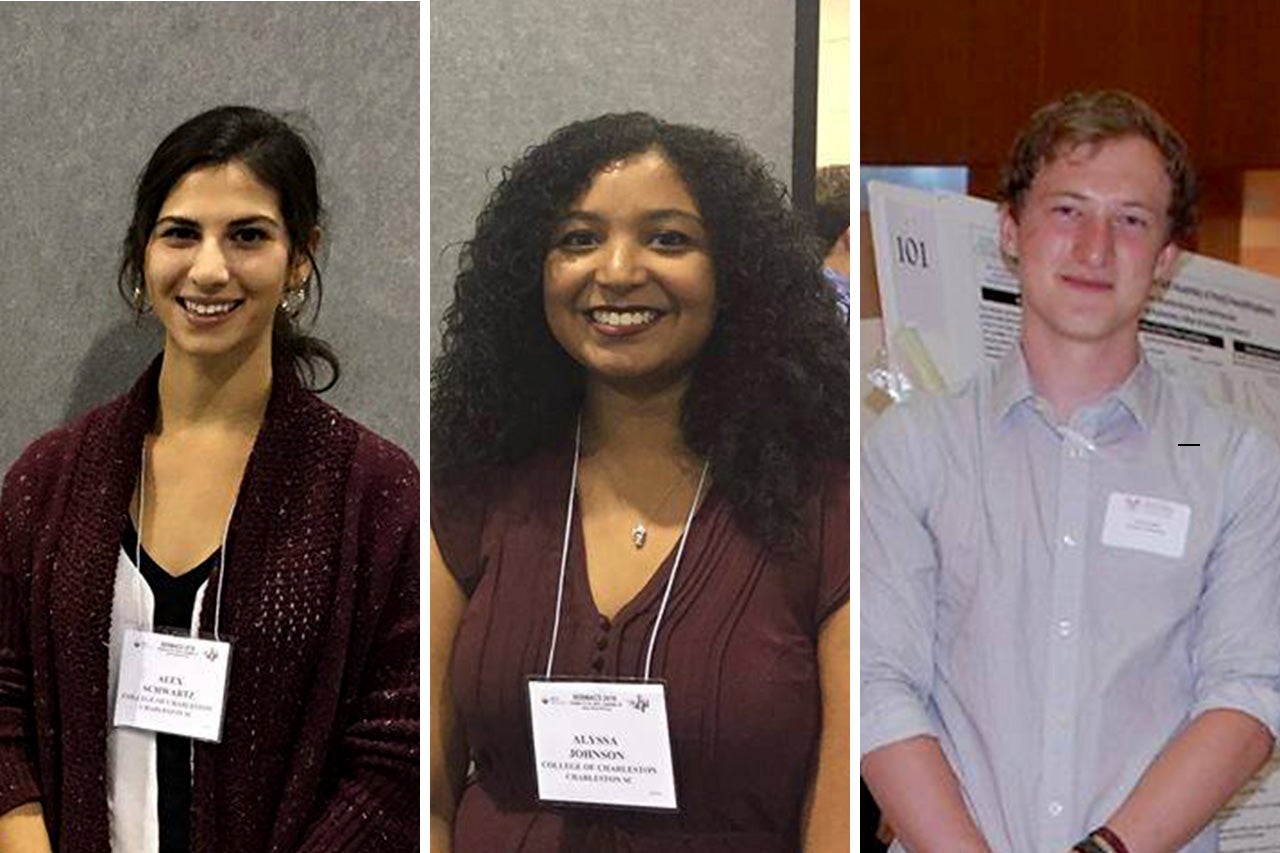Three College of Charleston students have been named Goldwater Scholars, one of the nation’s highest honors for undergraduates studying science, technology, engineering or mathematics.
Biochemistry major Alexandra Schwartz and chemistry majors John Cobb and Alyssa Johnson were among the 240 undergraduates to be honored by the Barry Goldwater Scholarship and Excellence in Education Foundation for their studies. The one- and two-year scholarships cover the cost of tuition, fees, room and board and books up to $7,500. The College was one of just a handful of schools around the country with three or more honorees.
“Like all Goldwater Scholars, Alyssa, Alexandra, and John are distinguished by extraordinary academic accomplishments, impressive and productive research engagements, and remarkable potential for making real contributions in their respective fields,” said Anton Vander Zee, assistant professor of English and director of the College’s Office of Nationally Competitive Awards. “What makes their applications stand out, however, was how effectively they were able to sketch out the big questions that drive their research, and how earnestly they presented themselves as accomplished researchers and engaged scholar-citizens.”
All three students, as with the majority of this year’s Goldwater Scholars, plan to pursue terminal degrees in their fields and hope to conduct research.
Schwartz, an Honors College student, plans to pursue a doctorate in cellular and molecular biology and conduct research to add to the understanding of brain chemistry and drug development. Cobb, also in the Honors College, hopes to earn his doctorate in physical chemistry and wants to conduct research to better model physical systems with applications in eco-friendly material design, and he plans to teach at the university level. Johnson — a member of the South Carolina Alliance for Minority Participation (SCAMP), a four-year enrichment program at CofC for under-represented minorities planning to major in science, technology, engineering and mathematics fields — plans to earn a doctorate in organic chemistry and to conduct research involving organic synthesis or polymer chemistry.
Cobb was ecstatic to be named a Goldwater Scholar, saying that the award validated his hard work and the efforts of his professors and mentors who helped him through the application process. He adds that the process of applying for the award itself was a “fantastic way to demonstrate attributes needed for a research career.”
“Besides helping out financially, the esteem of awards like the Goldwater acts as a stepping stone to help me secure more prestigious research opportunities, grants, and other scholarships,” he says. “Being involved in research as early as possible is important for someone considering a career in academia.”
Johnson adds that the scholarship “opens up a lot of doors” for graduate school and eases the financial burden of attending school.
“When I found out I was so happy,” she says. “All I could think was ‘I need to call my parents.’ I felt so proud and really grateful to my lab mate and mentors (at the College.)”
Professor Pamela Riggs-Gelasco, the chair of the Department of Chemistry and Biochemistry, says that having three Goldwater Scholars in chemistry is testimony to decades of dedication to creating and sustaining an environment where undergraduates can thrive in research.
She says that approach — and careful mentoring from professors, advisors, research mentors and others — has helped prepare students to be competitive for other national awards such as pre-doctoral fellowships with the National Science Foundation and the prestigious Howard Hughes Medical Institute’s EXROP research program (Johnson is participating in this summer’s program at Stanford University.) She adds that 30 percent of chemistry and biochemistry majors go on to pursue doctorate degrees, and almost all of them got their start in research at CofC.
“Our philosophy is that research is not just about generating new science, it is equally about generating new scientists,” she says. “That student-centered focus is in part why our students are successful and it is what we try to emphasize to prospective students.”
Schwartz says that the College’s research-minded approach — and the process of doing research for her Goldwater application — have influenced her career goals.
“Since I started doing research over a year ago, I have gained vital experience in the lab and as a scientist,” she says. “Because of my research, I have changed my future plans to become a scientist and get a Ph.D. in a similar field. I feel passionate about my research, and I suspect that came through in my progress and writing.”
The College is one of three universities in South Carolina with Goldwater Scholars this year. The College has produced several Goldwater Scholars in the last several years, including one each in 2016, 2015 and 2014. In 2013, two students received the honor. Two of those recent honorees were also from the chemistry department.
The Goldwater Foundation was endowed in 1986 in honor of the late Sen. Barry Goldwater and is aimed at fostering and encouraging outstanding students to pursue careers in the fields of mathematics, the natural sciences, and engineering. The Goldwater Scholarship is the premier undergraduate award of its type in these fields, and 7,921 students have received about $63 million in awards since 1989.
Pictured above are Alexandra Schwartz, left; Alyssa Johnson; and John Cobb.




